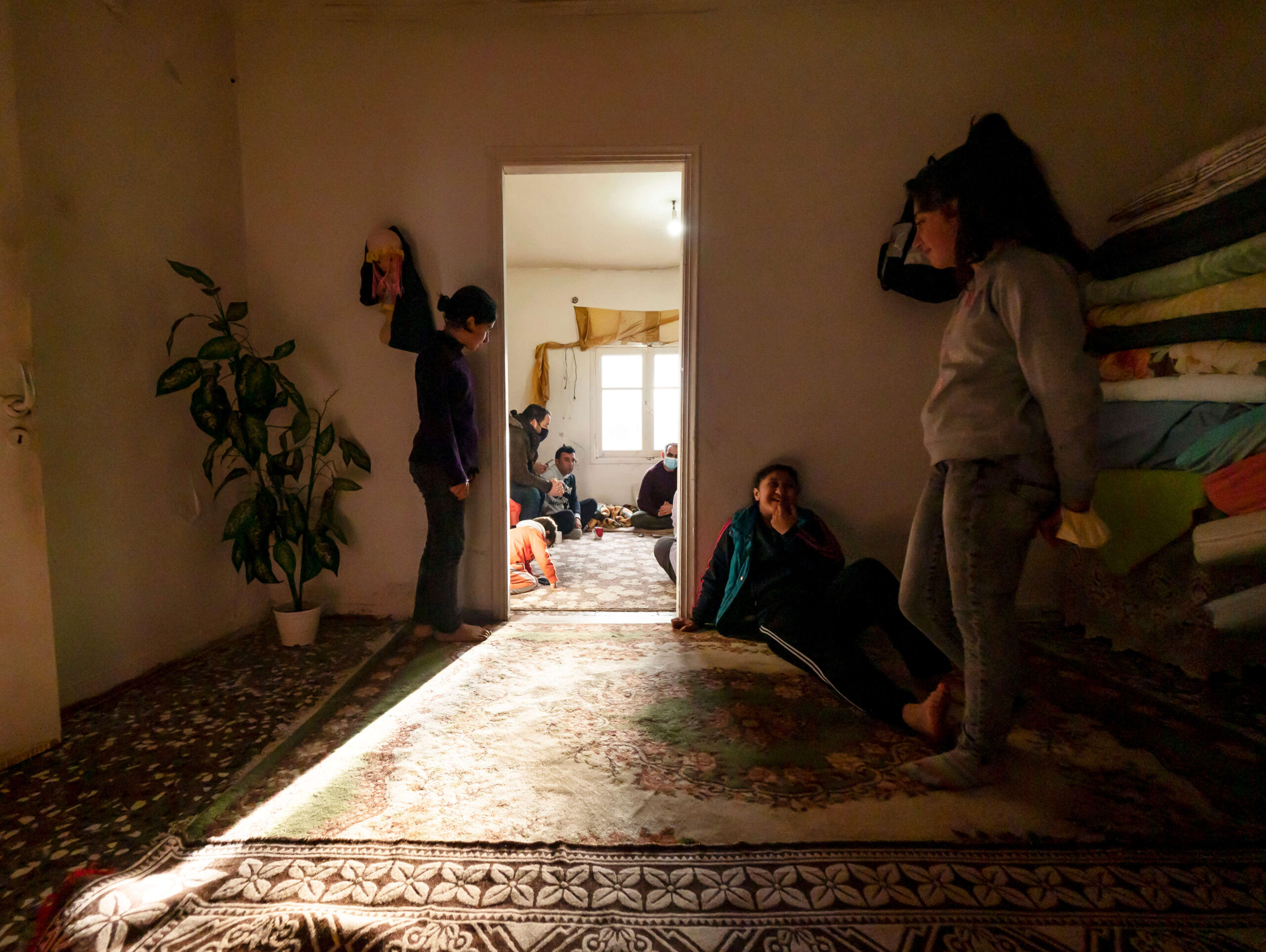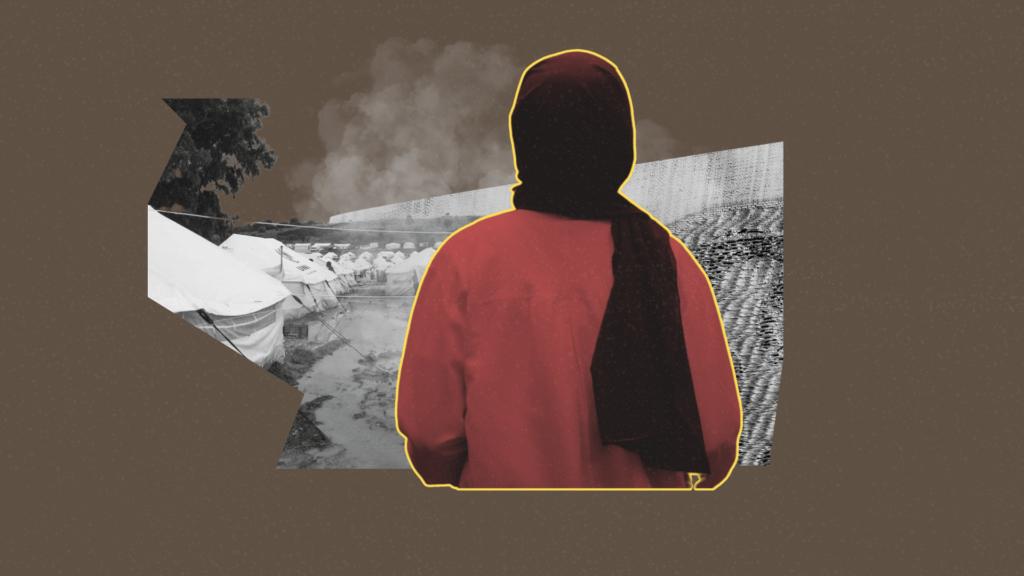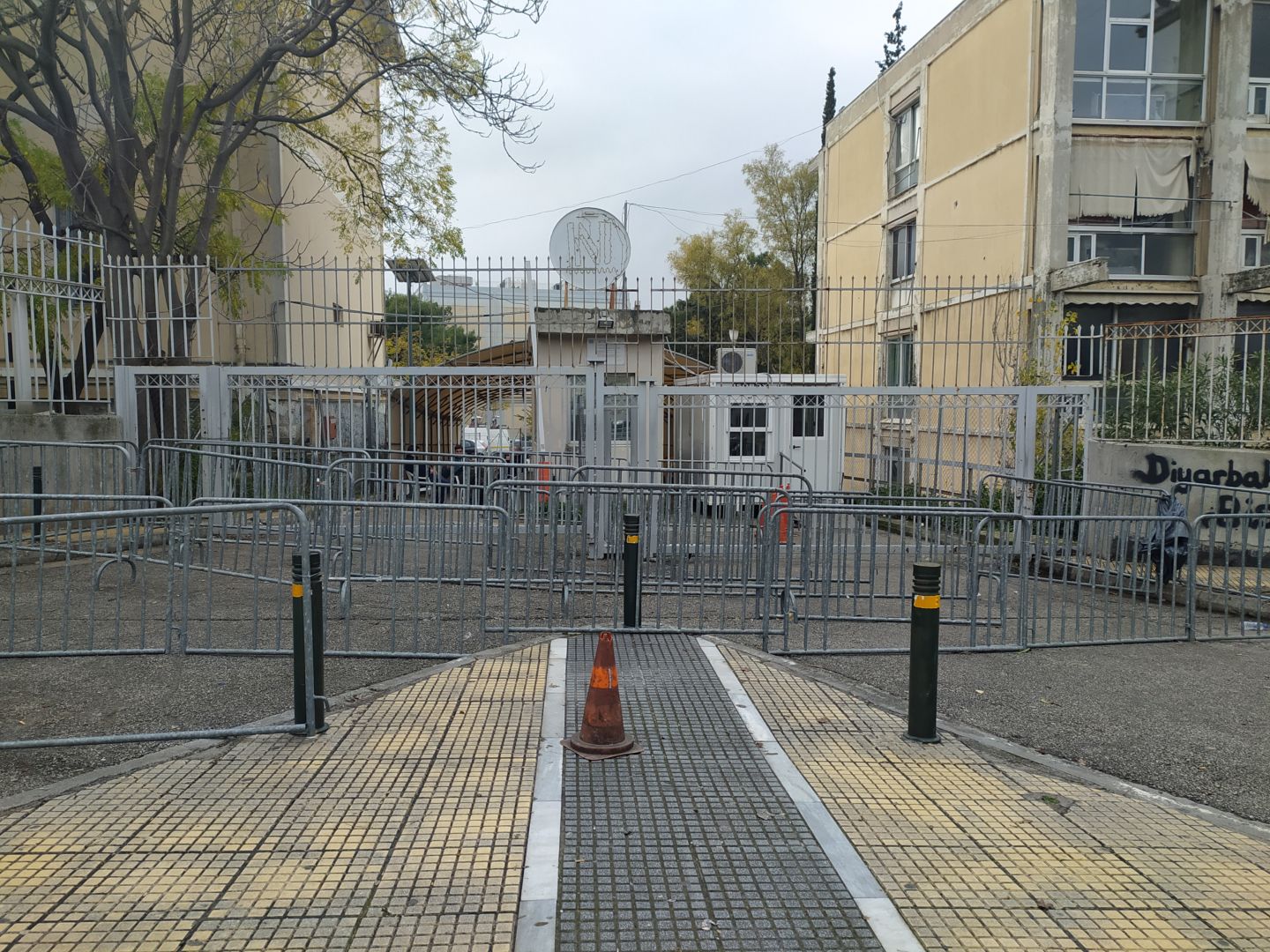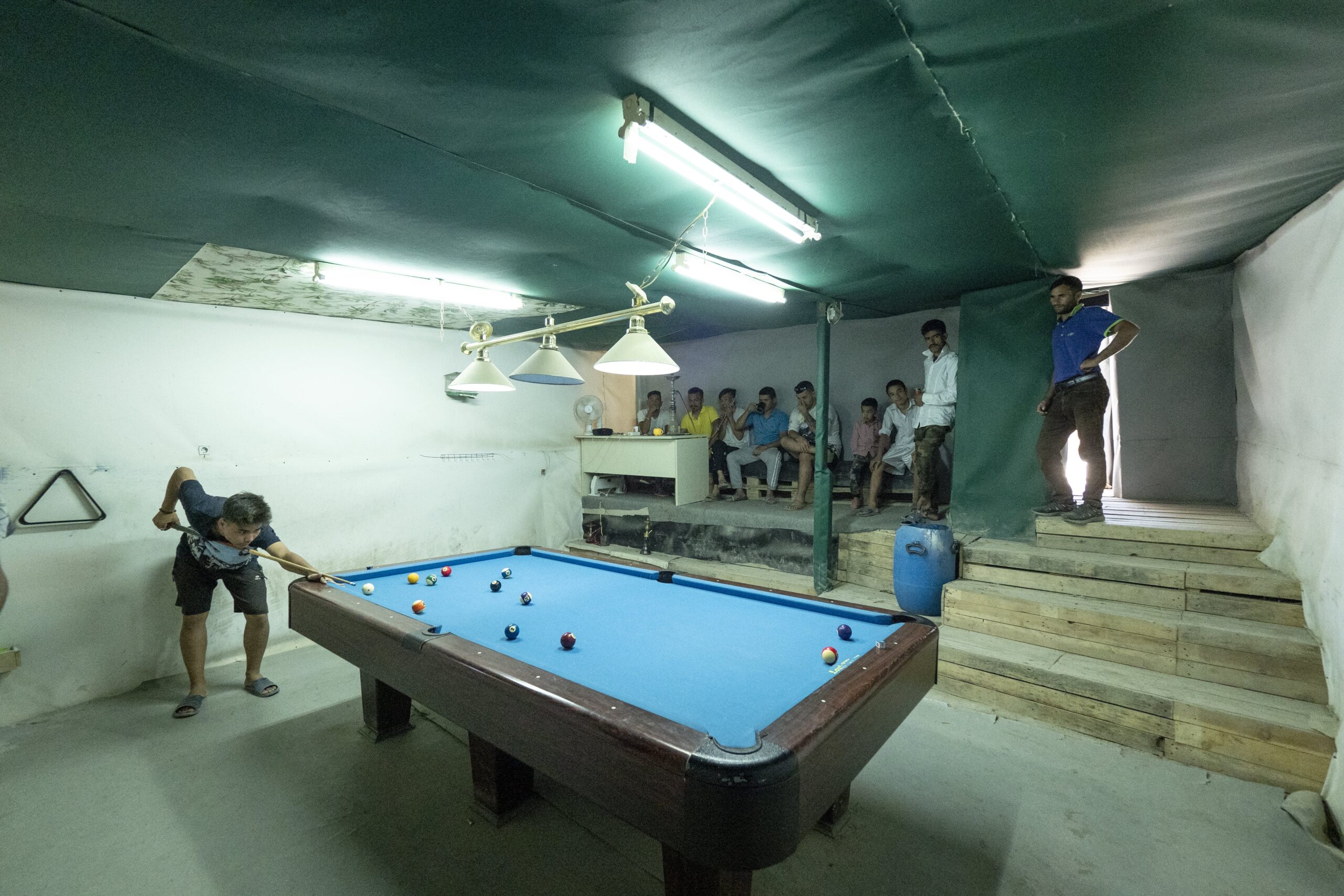Every morning Mike Mavinga wakes up around six. His wife has health issues, which is why the 33-year-old Congolese asylum seeker wants to finish chores at home before he leaves for work.
Around 7:30am he gets on his bicycle. It takes about 40 minutes to get out of Karditsa, and to continue on the Karditsa-Trikala ring road where large warehouses line both sides of the road, until he reaches the 3rd kilometer where the car lot (his place of work) is located.
He works until 1pm, and then he gets on the bicycle again, returns home and gets on Zoom to attend the Greek lessons sponsored by ANKA (local community development agency) for the city’s asylum seekers. Then he goes back to work.
It’s been a year since Mavinga arrived in Karditsa, a provincial town in the prefecture of Thessaly. Since July 2020 he’s been working at Lux Cars, where he maintains and cleans new and used cars on the car lot.
As soon as he got the job, he says, he felt better about life here. A month before he started working for the company, on June 12, 2020, his wife gave birth to their first child in Karditsa.
The next child, Mavinga jokes, will be named Fotis.

Mike and Fotis
Fotis Koukouravas is the owner of Lux Cars and Mavinga’s boss. In January, when the two of them welcomed us to the car lot, Fotis proudly showed us photos of Mavinga’s son on his cell phone.
He didn’t know Mavinga before he hired him. A friend of his lived in the same apartment building as Mavinga, where the Congolese family had been offered an apartment under the ESTIA housing program. The friend told Fotis about Mavinga and he was hired.
Mavinga speaks French. Fotis, who grew up in Germany, speaks German. Their daily communication includes hand gestures, which are supplemented with scattered Greek and English.
But the work gets done and is going well. After all, “now Mike also understands Greek,” says Fotis. “Isn’t that right?” Mavinga nods and smiles.
It’s not that Fotis hasn’t heard racist comments since he hired Mavinga. But, as he says, besides the fact that he’s lived abroad and knows what it’s like to be a foreigner, he doesn’t let these words affect him.
“I have learned to look people in the eye and, if he’s ok, then it’s all good. I don’t care about these comments because I am not a racist. And if I want, I will hire more migrants,” he says.
In fact, he already knows that he will soon need another employee, and Fotis is considering asking Mavinga to introduce him to someone from the African community of asylum seekers in Karditsa, of which he is president.

“It’s not easy to leave a country”
This year, March is doubly important for Mavinga, as in addition to turning 33 years old, he will also be interviewed for his request for asylum.
Fotis is optimistic: “He will stay, Mike will stay here.” Back in the Congo, Mavinga worked as an electronics technician, installing and maintaining telecommunication antenna of a large company. He had a house and, before being forced to leave it, he only knew the “basics” about Greece: that the country had won EURO 2004 in football and in the following years, experienced a financial crisis that lasted years.
A large number of asylum seekers in Greece envision their lives in another European country, with Germany being the most frequently mentioned. Some look for ways to leave the country, while their asylum applications are still pending. Others, even if they eventually receive asylum in Greece, depart for another European country as soon as they can.
Mavingka is not thinking of leaving Greece, going to Germany or any other country. “Well, maybe if the boss comes,” he says in jest. However, he adds, in a calm voice, that it’s not at all easy to leave one country for another.
He did it because he needed to. But he would not want to experience it again.
Access to employment and obtaining documents
In recent months, Solomon has been conducting extensive research on the employment realities for people on the move (asylum seekers, refugees, migrants) in Greece during the pandemic. In this context, and covering different regions of the country, we’ve spoken with individuals and government officials, researchers and people with experience in the field.
If we had to judge how representative Mavinga’s case is − in relation to the general experience that we’ve encountered during this time − a case of an asylum seeker who is an insured employee, has a close relationship with his employer, and is learning Greek with the aim to continue his studies and lay down roots in Greece, then we should, without hesitation, say that Mike Mavinga is the exception rather than the rule.
About five years have passed since the peak of the refugee crisis. During this period, the amount of EU funding that has been allocated to Greece exceeds €2 billion.
What about the integration of refugees into the labor market?
In theory, it is a “key priority” for both the current government, whose Minister of Migration and Asylum, Notis Mitarachi, has stated that “we want to enable refugees to become active members of the economy and society,” as well as the previous SYRIZA/ANEL government, which had presented the National Strategy for Integration.
In this strategy, employment is explicitly recognized as a key element of the integration process, as “finding a job is fundamental to participation in the economic and social life of the country.”
Solomon’s research shows that despite the government’s announcements, the years that have passed, and the amount of funding that Greece has received, few steps have actually been made towards this strategy.
In fact, we could argue that not only has employment integration not been achieved, but neither has it been taken into account. And that is why, inevitably, the images of recognized refugees being evicted from housing, which in recent weeks have been seen across Greece from Grevena to Corinth and Thessaloniki, and from Sparta to Chalkida, will only be repeated in the coming years.
Five Syrian refugees in Karditsa
Let’s return to Karditsa. It’s January 2021, it’s raining and damp in the valley, and Samir Hassan has used a piece of plastic to patch up the broken window of his farmhouse.
He knows that he’ll have to repair it immediately, in order to stay warm during the cold weather. But his limited income forced him to prioritize winter expenses: fix the window properly or buy wood for the stove.

During our visit to his home, my colleague Theodore Nikolaou and I are offered hot tea and cheap duty-free cigarettes from Acharnon. All five of Samir’s children observe us, or fall asleep listening to the adults’ conversation, while Hassan adds wood to the stove. Besides the mattresses, the wood-burning stove is the only piece of furniture that dominates the room, surrounded by damp walls.
In addition to Samir and his family, with us are Mohammad, Ali, Abderahman Pilar, Salim Mahmoud. And Feraz. Feraz is from Palestine and has been in Greece for 20 years. “I immigrated for love,” he jokes. He has studied to be an agriculturist, has lived in Thessaloniki and half a dozen other cities, and works as an interpreter at ANKA.
He is also our interpreter today, as he translates the words of the Syrians, who are recognized refugees and have been in Greece since 2018. They arrived on the island of Samos and stayed at the camp in Vathi, where they were “forced to go back in time, to 1,400 years ago” and “live with rats” before they were transferred to apartments in the town of Karditsa.
Common background is not the only thing the five Syrians share. They have all relatives or friends that, when the war started ten years ago, left Syria before they did. In other words, their relatives and friends had the “opportunity” to experience better living conditions on the Aegean islands where they ended up, but more importantly, they were able to continue on to Europe much faster.
And now, these relatives and friends have already managed to learn the language, they work, they have established new lives. Some even got loans and purchased cars for their family. We asked them, “What about you?” and they told us that they often depend on their relatives who have succeeded in Europe and must ask them for financial help to make ends meet.
“We know that some people think that all we want is to receive benefits and handouts. But while we were in Turkey we didn’t receive any kind of aid and we were fine − we were fine because we could work,” said Mohammad.
“We’re not lazy, we’re people who like to get tired. In Syria, children start working from the time they’re in elementary school.” But when the conversation turns to their work experiences in Greece, the tension rises and the expressions on their faces harden. As one narrates his experience, the others intervene, eager to share their own stories.
And what they have experienced, mainly, is labor exploitation.
A daily wage of €10 – €15
Back in Aleppo, Mohammad was running a mobile phone shop with his father. Salim Mahmoud made mattresses and curtains. Samir Hassan was a tailor in a factory, supervising 18 employees. In Karditsa, all of them have worked mainly in agriculture and construction – mostly uninsured, but sometimes with insurance.

Since 2015, when Karditsa began hosting refugees and asylum seekers, 25-50 people are employed every year in the agricultural sector through ANKA’s cooperation with local cooperatives and producers.
In addition, due to the pandemic, last summer the border with Albania (which is a main supplier of labor to the area) was closed for a long time. Thus, there was an even greater need for labor. Many got jobs and worked as insured laborers in the harvesting of peppers, tobacco, corn or cotton.
As Apostolos Kapsalis, a researcher at the Institute of Labor, explained in a recent interview with Solomon, the producers themselves prefer to employ workers with an ergosimo or “worker’s check”, since their payroll expenses can then be deducted from their taxes.
But the men we spoke to have worked in the fields, without insurance, for a daily wage of €10-€15. They have also “crammed” two daily wages into one day: Samir Hassan says that for a time, he worked in the morning in the fields and in the afternoon at a brick factory, from 7am to 8pm. His daily wage was €25.
They have gone unpaid for long stretches of time, during which they had to borrow money just to get to/from work. They’ve been deceived by their employers and were made to sign documents in Greek, (without knowing what they are signing) that confirmed their resignation. They realized months later that despite what they thought, they were working without insurance.
“No one else would agree to these wages”
Many of the employers mentioned in our conversation, however, remember them fondly. They are the ones who, even though they paid a small daily wage, treated them well and made them feel that they also have a place in Greece.
There’s an Arabic proverb that states “start with a little, to end up with a lot”. The men we spoke with said that even when they were paid little, in the morning when they’d head for the fields, they would sing enthusiastically.

“We don’t want to live in palaces, we just want to live. I have children to feed. So even if they pay me €10 for a job, I will go to work,” says Salim Mahmoud.
The rest of their employment opportunities were mainly in construction. Their fate is once again linked to that of the Albanians: they’re the ones who work on buildings being constructed in the city. The daily wage they receive for hard labor in construction jobs is €15.
They know that the employers who hire them are taking advantage of them, and they have, in previous decades, gone through the same experiences themselves. “They tell us themselves,” says Salim Mahmoud, “that when they came to Greece, they were in the exact same place we are today. And that no one else would accept the low pay that we accept.”
We asked the relevant authorities
At a theoretical level, a fact that should be taken into account is that both asylum seekers and recognized refugees in Greece have the right to work legally.
Under the previous government, once asylum seekers applied for international protection, they could seek employment. And under the current government, they have the right to seek employment six months after they file their asylum application.
The explanatory statement regarding this change in legislation maintains that the amendment has been introduced “in order not to make the asylum system attractive to third-country nationals.” But the reality is that such a “fear” is not credible anyway.
In an extensive interview with Solomon, researcher and author Paul Schlag, (who recently published his study on refugee labor market integration in Greece) stated that although theoretically refugees enjoy full access to the labor market, they are mostly forced into uninsured work resulting in their exclusion from labor rights and full social inclusion.
According to the UNHCR, there are currently about 119,700 asylum seekers and recognized refugees in Greece; 100,600 are on the mainland and 19,100 on the Aegean islands.
We requested data, albeit approximate, on the number of adults currently engaged in dependent employment and who receive the required insurance. We addressed the Ministry of Migration and Asylum, the International Organization for Migration and the UNHCR.
We received timely replies from the international organizations (IOM, UNHCR), but specific information on the matter was not available. The Ministry of Immigration and Asylum, which recently appointed a Deputy Minister responsible for integration, did not respond.
The situation is bleaker on the islands and reception centers
The circumstances in many parts of the country are a lot worse, as the difficulties begin long before the job search – from obtaining a tax number to opening a bank account.
In an employment guide for asylum seekers, the UNHCR aptly outlines the difficulties they may face, for example, in trying to open a bank account:
“Note that the experience of opening a bank account in Greece varies from person to person. Some banks are more helpful than others. You may consider seeking assistance from Greek friends or a Greek NGO.”
The asylum seekers and NGO staff who we spoke to said that it’s an extremely common practice for banks to refuse to open accounts for asylum seekers, even though a provision for doing so has been in effect for years.
In other cases, especially on the Aegean islands, the local tax authorities refuse, without explanation, to issue tax numbers to asylum seekers, even though provisions have been made for this as well. This offers some people the opportunity to act as “mediators” and after securing a fee from the asylum seekers, they go to specific tax offices, where they ensure that their “clients” will receive a tax number without any problems.
Things are just as bad at the reception centers in mainland Greece, which are managed by IOM, which operates 32 structures in mainland Greece, with a total capacity of 30,729. But among the adults, only one in three (32.66%) has a tax number. And only one in ten (10.90%) over the age of 15 is registered with OAED (employment agency).
It is estimated that even fewer people are employed with insurance. A typical example is Myrsini, in the prefecture of Ilias. In the early years of the refugee crisis, the reception center in Myrsini was considered a model center, as it provided decent living conditions for the residents, who were mainly of Syrian origin.
However, during the last harvest season – care was not taken for the refugees’ integration into the labor market nor was their existing vocational training utilized by the local community − refugees worked for a daily wage of €15 in the fields. Just like in Karditsa.
The importance of Karditsa
There are specific reasons why the example of Karditsa is of particular interest, regarding the employment of refugees. Karditsa, which has hosted refugees since 2015 and participates in the Network of Cities for Integration, is considered a very positive example in the Greek reality.
ANKA, (local community development agency), employs 36 people to provide services related to refugees. Problems that have existed elsewhere, such as banks refusing to open an account, have been avoided here, through the cooperation with the Cooperative Bank of Karditsa. In addition, interpreters and social workers are provided for refugees to help them communicate with public services.

Refugees who already live in Karditsa participate in the integration effort, as do new arrivals. Over the years, no incidents against refugees have been reported (as has been the case in other parts of Greece), and about 450 refugees are now among the town’s population of 55,000.
The positive relationships that have been formed between the refugees and the local population were evident during a catastrophic flood last September, when refugees reached out to help flood victims from the very first moment that disaster struck. There has been a similar mobilization to help deal with the pandemic.
Volunteering to make masks – because otherwise it is not possible
At Stavrodromi (or “Crossroads”), the Multicultural Center that was created in 2019 in Karditsa, we met 33-year-old Sabrin from Iraq and 31-year-old Sirouan from Syria.
In recent months, with the donation of sewing machines from the UNHCR and the help of Mrs. Michaela, they have sewn “entire kilometers of fabric” as Mrs. Michaela says. They produce about 150 masks a week which are then given to people in the town.

Sabrin and Sirouan have worked as tailors since they were very young and when the pandemic began, they volunteered to use their skills to help the local community. However, the problem of finding employment which will provide them with an income, remains.
They would both like to work. Sabrin says she has been searching for work since her first days in Karditsa, she wants “to feel useful and not just sleep and eat and sit.” She would like to stay in Greece. Like Mavinga, at the car lot, she is tired of leaving all the time.
The dream of Germany
The same does not apply to the five Syrians we met. They are determined to leave Greece when they receive their travel documents.
“I swear, right now I have only €10 on me to buy milk for the children. I’m ashamed to say it, but in town, we know there are people who look through the trash for food. Put yourselves in our shoes. What should we do? Beg or rob a bank? Since you don’t want us here, and we realize this, at least give us our travel documents so we can move on and best wishes to you all,” says Mohammad.
They believe that Greece will regret not using the potential of the refugees to its advantage. “Germany and Turkey did it, and they’re not stupid.” And, in speaking to their relatives in Germany, the idea of moving there themselves, where they can work and support their family, seems more and more appealing.
“We have no problem with the Greeks. On the contrary, we feel comfortable with the people and the climate, we often feel like we are back home. But I am 23 years old. I should be living my life normally, but so far I have only experienced pain and misery. I have to leave, at least for my children.”

The prospect of going to Germany exists in the minds of many asylum seekers and recognized refugees in Greece. Even in Karditsa, where many of the problems that exist in other areas, have been solved, every now and then someone leaves for Germany, and plans to build their life there instead.
The ANKA employees mention the case of a Syrian refugee, who, as they put it, could be the strongest example of integration. He had been living in Karditsa for a year and a half, he worked at a shoe factory, he was happy with his salary and life in the town.
However, even he saved $1,500 to pay for the “extra help” in order to get his passport issued earlier, and when he received it, he left for Germany. The prospect of life in Germany has another affect too: when Greek classes are offered, there is often little participation. Asylum seekers prefer learning German, or English, which they think will be more useful to them.
Is there a plan for integration in Greece?
The government has stated that the issue of integration is a priority.
But the situation remains ambiguous, as the government has recently appointed a Deputy Minister responsible for integration. But the person chosen for this position has, in the past, referred to asylum seekers arriving in Greece as “unarmed invaders”.
In one of her first official statements after taking office, Sophia Voultepsi spoke of the skills that refugees will obtain, which “will be useful when they return to their own countries.”
But in reality, the refugees cannot return to their countries. To be precise, they are prohibited from returning, and if they choose to return to their country, they lose the protection status granted to them (since it means that they are no longer in danger there). Most of all, though, they cannot return under the current conditions.
“If there was no war, we wouldn’t have left. If the issue was simply that we were hungry, we would have stayed put and just be hungry. We did not plan to leave our country, we never even left our city before the war broke out,” Hassan said shortly before we all said goodbye.
“But now we can’t go back, because the regime considers us deserters. I left Syria so that I would not be killed and so that I would not have to kill anyone.”
The article is published in the context of Solomon’s in-depth series of reports on “Migrant workers in Greece in the time of COVID-19 ″ and is supported by the Rosa Luxemburg Stiftung Office in Greece.












